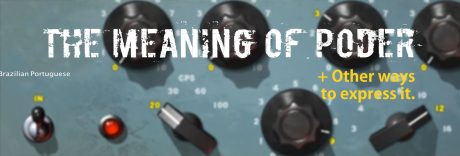
Prepositions, Verbs, and the Infinite Web of Brazilian Portuguese You may have noticed that certain verbs in Portuguese often get paired up with a de, a com, por, em ETC. That’s because certain verbs need something between themselves and the next verb in the sentence — a connector. A preposition. And they are very choosy…
Read more...

There are three ways that Brazilians ask, “what happened?”: (1) O que aconteceu?; (2) O que foi?; (3) O que houve? (verb HAVER). And they often mix these together! Ordered by popularity they are: O que aconteceu? You’ll often hear it said like this: O que é que aconteceu. = literally: What is (it) that…
Read more...

We’ve written about ACABAR de before — because it’s such a useful combination. When you place a de after acabar, it takes on the meaning of, to have just. ACABAR in Portuguese by itself means: to end, to end-up, to finish. Everyone gets these mixed-up (confundida) ~ That DE makes all the difference! Use ACABAR…
Read more...

What’s so special about the verbs PARAR & COMEÇAR? For starters you’ve probably noticed that you always have to treat these verbs a little differently. For example, you can’t say “I stopped eating sugar” like this: eu parei comer açucar (NÃO!) — you need to include a de like this: Eu parei de comer açucar….
Read more...

The meaning of PODER in Portuguese is similar to other verbs CONSEGUIR, DAR, and TER. While PODER is most common, knowing how to use others will give you super-powers. This post will show you the best, most common ways all of these verbs are used to say that something is possible or, can be done.
Read more...

The phrase “Um ao Outro” in Portuguese can be translated as “each other” or “one another.” In this post you’ll see exactly how it’s commonly used, and how to deal with different genders and variations. “Um ao Outro” is crucial for expressing reciprocal actions or relationships in Portuguese, allowing for more accurate and natural communication.”
Read more...

Discover the different ways Brazilians express “about” in Portuguese, from “regarding” to “approximately.” Getting a grasp on these expressions is a matter of learning them in-context and with good examples. 🇧🇷
Read more...

The Portuguese Imperative can be confusing! Brazilians simply do not use the imperative in a consistent way! There is however, a method to the madness. Let me explain. The conjugation of the imperative (used when giving a command) is the same as the present tense WHEN using the informal “tu” form. In other words…
Read more...

The Portuguese verb DAR is a shape-shifter. When combined with other wordfs it can take on meanings like: working out, able to, worth it, can & cannot. We’ll dive into its multifaceted meanings, from giving luck to taking charge. Explore 7 uniquely useful ways DAR adds life and detail to what you want to say.
Read more...

If you already know how to use SER & ESTAR correctly, you’re ready this: our ultimate reference for ESTAR. All of the tenses and moods (with examples) ESTAR can be used for in Portuguese. BEHOLD the glory of ESTAR 🇧🇷.
Read more...

By combining ACABAR with “de” (acabar de) you immediately gain SUPERPOWERS. You’ll be able to say things like: I just arrived; She wound up buying that car, and more! The amazing thing about Portuguese is that you can shape-shift verbs just by adding connector words like “de” or, “a” for example.
Read more...

Use the Future Subjunctive to talk about future events that are UNSURE to happen. The words IF and WHEN usually often trigger this tense. For example: Quando você chegar no Brasil, me ligue! This is likely to happen, but NOT 100% certain. Notice that the conjugation is simply the INFINITIVE form of the verb!
Read more...

In Portuguese, there are several ways to refer to something that happened in the past, each with varying shades of meaning. Verb tenses! The Past Imperfect – officially called the Imperfect Indicative (o Pretérito Imperfeito), is used when talking about continuous or ongoing action in the past. Something that used to occur or, would always occur….
Read more...

What is the Portuguese JEITO? It’s just an expression: JEITO = way, as in: let’s find a way. It’s somewhat notorious because Brazil has been known as the place where anything is possible. This comes mostly from the recent past in which one could for example, buy their way into a green card, bribe someone…
Read more...

In the previous post we talked about this verb tense — the imperfect subjunctive, as well. So many of you have asked to see even more examples of this super-useful grammar trick so: aqui estão! (here they are!) the Imperfect Subjunctive is insanely great. Even better with the Conditional! And BTW, only language professors need…
Read more...

The subjunctive mood has been known to break students. Every serious Portuguese student runs straight into it. Some get hurt. Some get scared. But it doesn’t have to be that way. The Portuguese Subjunctive is actually a rose with thorns. It’s a beautiful part of the language that should be embraced and used with style,…
Read more...

Assim is the 90th most used word in the Portuguese language! Assim has two main meanings: Assim in Portuguese = like this, like that Eu sou assim. ➜ I’m like this/that. The verb SER is used because this is a permamnent condition. Nós somos assim. ➜ We’re like this/that I just wanted to show the…
Read more...

How do Brazilians use FALAR and DIZER? Is there really a difference?
Read more...

Using the Imperfect Subjunctive Portuguese uses the Subjunctive mood to indicate something is uncertain to happen or to have occurred. There are 3 different degrees of uncertainty: (1) extremely unlikely, (2) plausible, (3) likely. The Imperfect Subjunctive is used for case (1): actions that are extremely unlikely to happen or to have happened. If I were…
Read more...

Ter in the Future Tense The common way is to use the verb ir as a helper verb (the future tense with ir) Eu vou ter mais tempo amanhã. > I’m going to have more time tomorrow. Ele vai ter que correr. > He’s going to have to run. Você vai ter uma namorada nova….
Read more...

How do you say something like, I’d like to go with you sometime or ask, Can we play with you guys? In Portuguese there are several key verbs that make it easy and clear that you’d like to do something – to participate. Portuguese invitational verbs participar: to participate poder: to be able to, can…
Read more...

I found it confusing having two verbs for to wait. ESPERAR AGUARDAR Waiting, in Portuguese – parsing the possibilities What is the difference? When talking about waiting you won’t find a hard rule for either of these verbs. Look at these examples: Eu vou esperar você voltar ao hotel. > I’m going to wait for…
Read more...

A student just reminded me of a very cool YouTube comedy channel called Porta dos fundos. Besides being insanely funny, it’s actually funny to non-Brazilians as well (but, for advanced & intermediate learners). Even I find most of the great Brazilian way too hard to laugh at. There are just too many subtle cultural references…
Read more...

There are several verbs that when used in specific ways open the door to new possibilities. Let’s look at the combination, A partir de and how this one can be used. The Portuguese verb PARTIR means: to leave, depart, go away. a partir de When combined like this, partir takes on the meaning: starting from…
Read more...

Why is this so hard to say? to run into, to bump into: Saying it in Portuguese. When you’re in Brazil it’s normal to spend much more time on foot, walking the streets. Even though automobiles inundate life as here, the infrastructure of most cities just can’t handle them and as a result, there are…
Read more...

Chegou a hora – in Portuguese means of course: the time has arrived, the time has come, or simply, it’s time. Seems so simple, right. But how would you say something like: “when the time comes to…” or, “please, be on time –? Simple Use: Chegou a hora de trabalhar. ➜ It’s time to work….
Read more...

Is there no end to the suffering? It’s not enough that we have to learn to conjugate 3 different verb types (the ar, ei & ir endings). There is yet another group: the Portuguese ~or verbs! Sim, e não. The good news is, there are only a few of these actually used and: their conjugations…
Read more...

We all have our own unsolved mysteries about SAMBA, right? Do you really have to go to a samba school to learn samba? Is there some store where you buy those outfits? Can men samba too? Does it mean you’re gay if you do? It’s just like salsa – but with less clothing? It just…
Read more...

There’s this perception that Brazilians enjoy a drink. Verdade ou mito? VERDADE. It’s the weather. Imagine if all the skanky bars in your town were open air, tables spilling out onto the sidewalk where you could instantly see smiling people with cold drinks. I bet you’d stop by at least once in a while. That’s…
Read more...

It took me forever to learn how to express the idea of to suppose or, to assume. I would always wind up using achar or, imagniar — both of which really don’t mean the same thing. The solution is simple, elegant – and rare: SUPOR in Portuguese means to suppose. A verb ending in -or! These…
Read more...





























